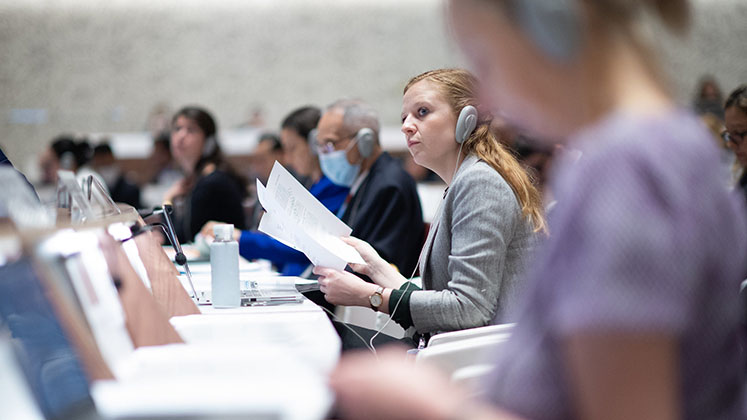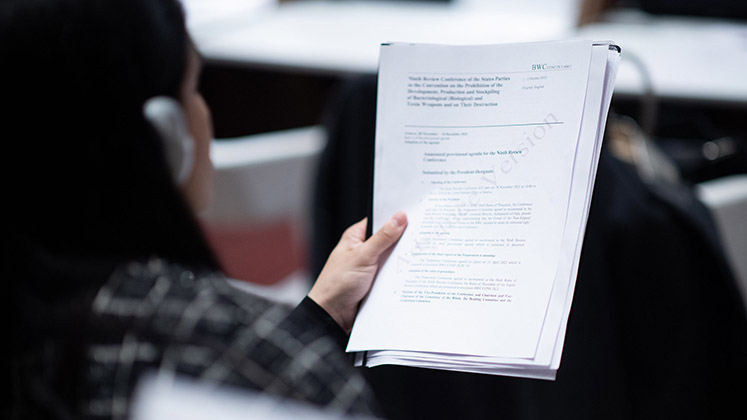13 March 2023
The Ninth Review Conference of the Biological Weapons Convention (BWC) concluded in December 2022, providing a positive end to a difficult year for arms control, disarmament, and nonproliferation. Geostrategic tensions had manifested in the Tenth Review Conference of the Treaty on the Non-Proliferation of Nuclear Weapons (NPT) and also in biological disarmament diplomacy, where allegations of bioweapons labs tested the regime. But despite these tensions, a consensus did emerge at the BWC Review Conference. The Final Document lays the foundation for potential steps toward strengthening the effectiveness of the Convention and charts a course for the next five years and beyond.

“Over the course of the Conference, positive female participation and leadership took a step forward.” (UN Photo/Violaine Martin)
Modest success in a challenging environment
The consensus final document established a Working Group to begin work on several crucial topics, including compliance and verification – a topic largely marginalized in the BWC since the collapse of the protocol negotiations in 2001. Besides, the Review Conference renewed the mandate of the Implementation Support Unit (ISU), the three-person unit that supports the Convention, and made provisions for an additional ISU position. The mandate for the next five years also holds potential prospects for the establishment of mechanisms to facilitate support on international cooperation and assistance, as well as on assessing scientific and technological developments of relevance to the BWC.
Over the course of the Conference, positive female participation and leadership, notably through the Committee of the Whole and Drafting Committee, demonstrated a step forward in arms control, non-proliferation, and disarmament forums. The Conference welcomed an unprecedented 48 NGO, civil society, and private sector stakeholders, all of whom brought together different communities working on or around the life sciences in discussing best practices and galvanizing efforts to bolster biosecurity. A vibrant buzz generated by media attention and youth delegates in the first week of the Conference injected fresh perspectives into the process. Moreover, the multiple daily side events hosted mostly by States, as well as by international organizations, professional associations and academic entities, provided substantive input from a diverse range of voices beyond those of State Parties.
Unmet potential for aspirational goals
However, like many other arms control and disarmament talks especially since the invasion of Ukraine, the Conference experienced procedural setbacks. States Parties were unable to reach consensus on an article-by-article review by the end of the Review Conference. In view of the failure to adopt a final document at the Tenth NPT Review Conference and the uses of Article V and Article VI to address Russian allegations of biological weapons development, this was not a surprising outcome, yet it remains somewhat disappointing. The focus was placed on the forward-looking third section that offers decisions and recommendations. However, absence of specific language addressing biological disarmament and taking stock of the past seven years of biological disarmament diplomacy through an article-by-article review may trouble future talks.

“The consensus final document established a Working Group to begin work on several crucial topics.” (UN Photo/Violaine Martin)
A number of ambitious proposals were also either lost or diluted throughout the Conference despite significant efforts by States Parties and other stakeholders to achieve a more ambitious outcome. References to the Tianjin Biosecurity Guidelines for Codes of Conduct for Scientists and the SecBio platform, among other initiatives, were unfortunately abandoned. Efforts to establish a cooperation entity for Article X activities and science and technology (S&T) review mechanism were preserved but only in a far weaker form. Language on gender-equitable participation in the BWC and the role of gender in the provision of assistance, inter alia, were deleted from the draft Final Document, as was any reference to the COVID-19 pandemic. Given the devastating effects of the pandemic and the demonstrable power of advances in biotechnology over the last decade, the lack of a more ambitious outcome leaves much to be desired.
The Meeting of Experts (MX) in the last intersessional process will be replaced with a new Working Group mandated to give recommendations on strengthening and institutionalizing the Convention before the Tenth Review Conference. The Working Group has latent potential to significantly advance the BWC. However, there remains a risk that the same obstacles of perennial geopolitics and consensus-by-deferral seen in the previous intersessional process could stifle substantive work of the new Group. And there is still much to be decided around the format, sequencing of agenda items and management of this Working Group.
An open-ended pathway forward
The intersessional Working Group for the 2023-2026 period is open to all States Parties. It was created with the aim of strengthening the effectiveness and improving the implementation of the Convention in all its aspects, with a preliminary content agenda on a range of topics including assistance, response and preparedness under Article VII and national implementation of the Convention. Many administrative aspects of the Working Group are, nevertheless, still unclear. It is not yet decided how the topics will be scheduled, how the Working Group will integrate external expertise, or how it plans to remedy limitations of the MX process. The Group, which holds its first session this week, has much ground to cover, and the deliberation of these questions will be key.
In considering how to advance its work, the Working Group may find it useful to draw inspiration from parallel processes in disarmament, not least the Open Ended Working Group on Reducing Space Threats through Norms, Rules and Principles of Responsible Behaviours. Particularly notable here are measures to integrate external expert views through a standing invitation to non-governmental entities to participate as observers and the attendance of other international organizations, commercial actors and civil society representatives. The active and dynamic involvement of non-States Party entities in discussion around space security has facilitated input that stimulates thinking and raises awareness of industry and civil society perspectives on disarmament.
Biosecurity and biological disarmament cannot remain siloed and insulated from wider trends in the scientific and technological community. As biotechnology continues to advance, converge and spread around the world, interaction with stakeholders working on relevant technologies internationally will become ever more important for both biosecurity and biological disarmament. The Working Group provides an important opportunity to advance the BWC and re-shape relations with external stakeholders. States should seize this chance in setting up the Working Group.
Vivienne Zhang and Manon Blancafort are Graduate Professionals for the WMD and Space Programmes at UNIDIR. Sarah Erickson is a Research Assistant for the Space Security and WMD Programmes at UNIDIR.

